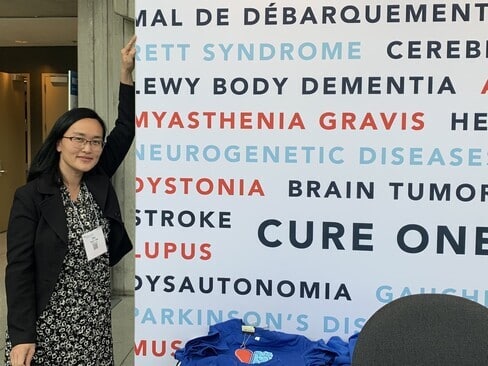

![]()
In collaboration with the American Academy of Neurology (AAN) and American Brain Foundation (ABF), the MdDS Foundation is funding a Clinical Research Training Scholarship focused on MdDS. The two-year award totaling $150,000 aims to recognize the importance of good clinical research and to encourage early career investigators in clinical studies on Mal de Débarquement Syndrome and Central Vestibular Neurological Disorders. Applications must be submitted by September 14. Details are available on the AAN website.
While the AAN and ABF are actively implementing targeted outreach to solicit applications for this year’s award, we need your help in spreading the word! Please share this announcement with the offices and clinics of your health care providers. This is especially important if they are associated with an academic (university) program. Ask your health care professionals to help in our search for early career investigators who might be interested in MdDS research training. Finding the cure for MdDS depends on it, and you!

Diagnostic Criteria of Mal de Débarquement Syndrome
MdDS can be diagnosed and without laboratory testing. Dr. Yoon-Hee Cha led the international committee that established the diagnostic criteria. Excerpted from the consensus document of the Classification Committee of the Bárány Society:
A. Non-spinning vertigo characterized by an oscillatory perception (‘rocking,’ ‘bobbing,’ or ‘swaying’) present continuously or for most of the day1
B. Onset occurs within 48 hours after the end of exposure to passive motion2
C. Symptoms temporarily reduce with exposure to passive motion3
D. Symptoms continue for >48 hours4
Commitment to Cures Gala
To raise awareness of Mal de Débarquement Syndrome, the MdDS Foundation was a HOPE sponsor at the recent American Brain Foundation Commitment to Cures gala. Celebrating brain disease research, the gala took place on April 26 in Boston, MA.
The evening was packed with special entertainment and inspiring stories from advocates and researchers who are working towards the cures of tomorrow. A record number of event sponsors with 36 individuals, businesses, and academic institutions supported the ABF’s mission to “Cure One, Cure Many.” Over $565,000 was raised, all of it going to support critical brain disease research.

We thank the AAN, the ABF, the other sponsors, and all who support life-changing research projects. A donation today helps us continue this critical work. Make a Donation
This is great – thank you. I have sent it to VeDA, most of the people/researchers I know who have patients with MdDS and also to a patient with MdDS who has some good contacts in Taiwan. If there was a link we could share on Facebook etc that might help since emailing people is a bit laborious and seeing this in the groups can be encouraging, both for new members and ‘long haulers’. There is still some antipathy to the term ‘cure’ but hey.
We are so far behind with MdDS research in the UK and I keep being told variations on the theme of ‘it’s ‘medically unexplained symptoms’ and there hasn’t been any proper research” (re the VOR protocol) which is not remotely helpful, either to patients or to the doctors who treat us. One Hospital Trust told me they would be disinclined to research or treat a condition which might spontaneously remit, which made my blood boil (metaphorically) and PPPD is being massively over diagnosed here, which doesn’t help. However we are working on a UK strategy for p/w MdDS (slowed down by one of the key players getting Covid) which we hope will shorten the diagnostic odysseys for people here and help our Health Care Providers to help us 🙂
Many thanks again and all best wishes,
Polly